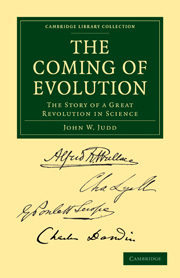Book contents
- Frontmatter
- Contents
- CHAP. I Introductory
- CHAP. II Origin of the Idea of Evolution
- CHAP. III The Development of the Idea of Evolution to the Inorganic World
- CHAP. IV The Triumph of Catastrophism over Evolution
- CHAP. V The Revolt Scrope and Lyell against Catastrophism
- CHAP. VI The Principles of Geology
- CHAP. VII The Influence of Lyell's Works
- CHAP. VIII Early Attempts to establish the Doctrine of Evolution for the Organic World
- CHAP. IX Darwin and Wallace: The Theory of Natural Selection
- CHAP. X The Origin of Species
- CHAP. XI The Influence of Drawin's Works
- CHAP. XII The Place of Lyell and Darwin in History
- Notes
- Index
- Plate section
CHAP. X - The Origin of Species
Published online by Cambridge University Press: 07 September 2010
- Frontmatter
- Contents
- CHAP. I Introductory
- CHAP. II Origin of the Idea of Evolution
- CHAP. III The Development of the Idea of Evolution to the Inorganic World
- CHAP. IV The Triumph of Catastrophism over Evolution
- CHAP. V The Revolt Scrope and Lyell against Catastrophism
- CHAP. VI The Principles of Geology
- CHAP. VII The Influence of Lyell's Works
- CHAP. VIII Early Attempts to establish the Doctrine of Evolution for the Organic World
- CHAP. IX Darwin and Wallace: The Theory of Natural Selection
- CHAP. X The Origin of Species
- CHAP. XI The Influence of Drawin's Works
- CHAP. XII The Place of Lyell and Darwin in History
- Notes
- Index
- Plate section
Summary
In the preceding chapter I have endeavoured to show how the hypothesis of Natural Selection originated in the minds of its authors, and must now invite attention to the way in which it was introduced to the world. What has been said earlier with respect to the labours and writings of Hutton, Scrope and Lyell may serve to indicate the great importance of the manner of presentment of new ideas—the logical force and literary skill with which they are brought to the notice of scientific contemporaries and the world at large.
There are some striking passages in Darwin's naive ‘autobiography and letters’ which indicate the beginnings of his ambition for literary distinction. It must always be borne in mind in reading this autobiography, however, that it was not intended by Darwin for publication, but only for the amusement of the members of his own family. But the charming and unsophisticated self-revelations in it will always be a source of delight to the world.
When making his first original observations among the volcanic cones and craters of St Jago in the Cape-de-Verde Islands, he says ‘It then first dawned on me that I might perhaps write a book on the geology of the different countries visited, and this made me thrill with delight.’
- Type
- Chapter
- Information
- The Coming of EvolutionThe Story of a Great Revolution in Science, pp. 115 - 135Publisher: Cambridge University PressPrint publication year: 2009First published in: 1910



